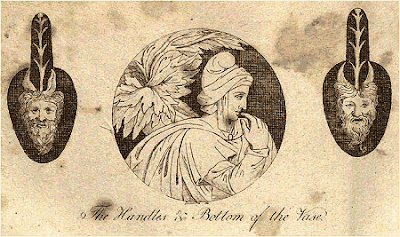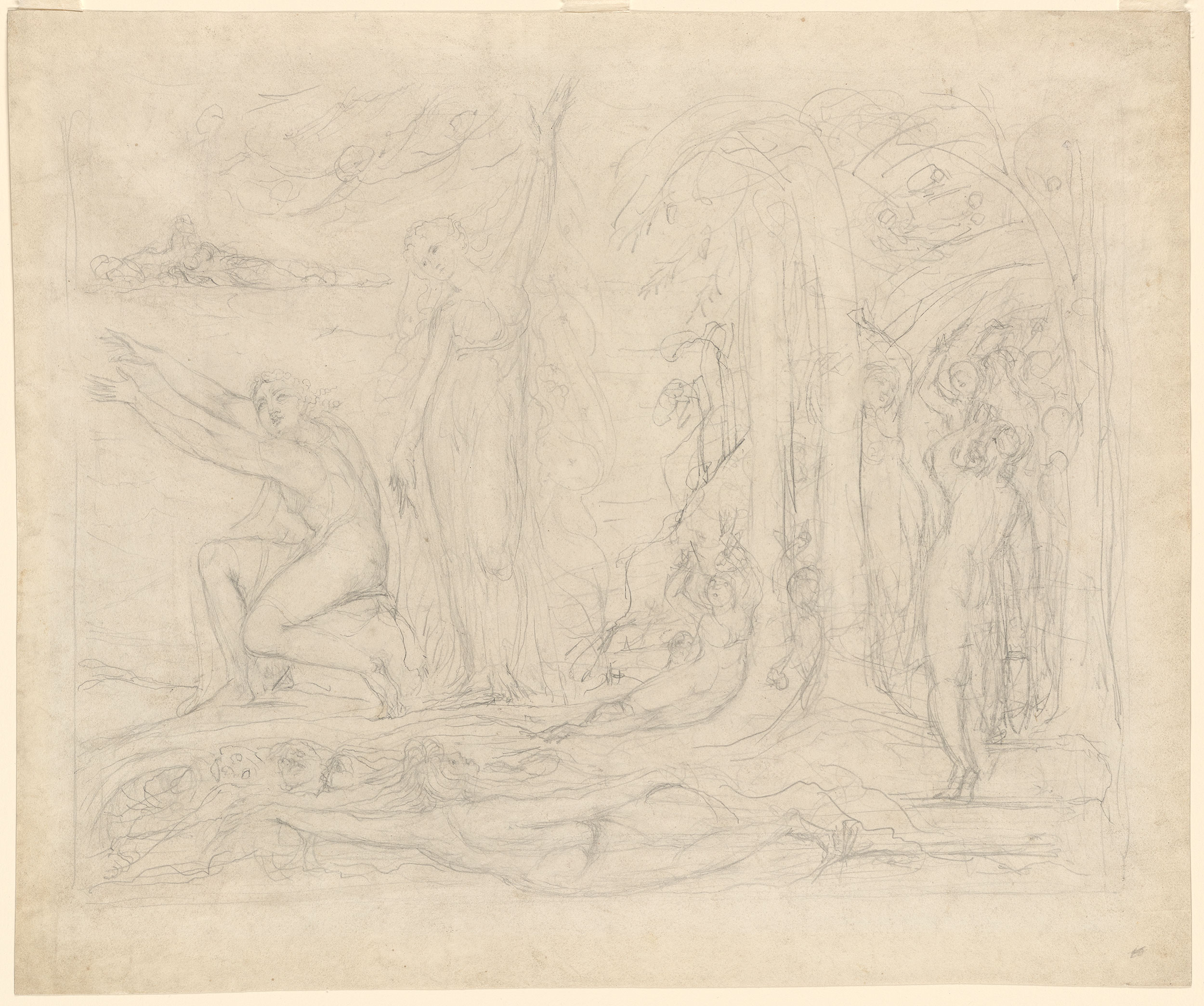Reformatted from February 26, 2015.
We saw in a previous post that Blake thought Natural Religion an "Impossible absurdity." Something which calls itself religion and limits perception to sensing and reasoning, has misunderstood the meaning of the concept of religion. Without God religion is absurd. In one of Blake's earliest engraved poems he presented his argument that man sees only himself, not God, if he relies of his senses and his reasoning to provide him with a religion.
There is no Natural Religion, (E 2)
THERE is NO NATURAL RELIGION
The Author & Printer W Blake
The Argument
Man has no notion of moral
fitness but from Education.
Naturally he is only a nat-
ural organ subject to Sense.
Man has no notion of moral
fitness but from Education.
Naturally he is only a nat-
ural organ subject to Sense.
I
Man cannot naturally Per-
Man cannot naturally Per-
cieve, but through his natural
or bodily organs
or bodily organs
II
Man by his reason-
ing power. can only
compare & judge of
what he has already
perciev'd.
Man's reason can only process what it has
received
compare & judge of
what he has already
perciev'd.
III
From a perception of
only 3 senses or 3 ele-
only 3 senses or 3 ele-
ments none could de-
duce a fourth or fifth
Each sense is limited to its own ability to
receive data.
duce a fourth or fifth
IV
None could have other
than natural or organic
thoughts if he had none
but organic perceptions
Sense perceptions provide only material
which can be processed mechanically.
than natural or organic
thoughts if he had none
but organic perceptions
V
Mans desires are
limited by his percepti
ons. none can de
limited by his percepti
ons. none can de
-sire what he has not
Without the ability to perceive
extra-sensory data man is cut off from desire for more.
perciev'd
VI
The desires & percepti-
ons of man untaught by
any thing but organs
of sense, must be limited
to objects of sense.
Without desire or additional means of
perceptions, man is trapped in a state of 'single vision.'
any thing but organs
of sense, must be limited
to objects of sense.
THERE is NO NATURAL RELIGION
[b]
I
Mans percepti-
ons are not bound-
ed by organs of
perception. he per-
perception. he per-
cieves more than
sense (tho' ever
so acute) can
discover.
Man's senses provide limited information.
However man has the ability to perceive more than the narrow
range which his eyes, ears, nose, mouth and skin can sense. sense (tho' ever
so acute) can
discover.
II
Reason or the ra-
tio of all we have
already known.
is not the same that
it shall be when
we know more.
If we were to depend on reason alone we
would not be able to go beyond the limit that reason is able to
discern.already known.
is not the same that
it shall be when
we know more.
[III lacking]
IV
IV
The bounded is
loathed by its pos-
loathed by its pos-
sessor. The same
dull round even
of a univer[s]e would
soon become a
mill with complica-
dull round even
of a univer[s]e would
soon become a
mill with complica-
ted wheels.
Input from outside of a limited system
prevents it from becoming a continual repetition of the same
events.
V
If the many be-
come the same as
the few, when pos-
the few, when pos-
sess'd, More! More!
is the cry of a mista
is the cry of a mista
-ken soul, less than
All cannot satisfy
Man.
Continually treading the same ground cannot
satisfy man no matter how often it is repeated.All cannot satisfy
Man.
VI
If any could de-
sire what he is in-
capable of pos-
sessing, despair must
be his eternal
lot.
The desire for more than man can access
through his senses and reasoning power would lead to a dead end
if he were incapable of perceiving more. be his eternal
lot.
VII
The desire of
Man being Infi-
Man being Infi-
nite the possession
is Infinite & him-
is Infinite & him-
self Infinite
If man is capable of desiring more than his
limited faculties provide, he opens himself to achieving a
perception of the Infinite through perceiving the Infinite
within himself.
Conclusion,
If it were not for the
Poetic or Prophetic character. the Philo-
sophic & Experimen-
tal would soon be
at the ratio of all
things & stand still,
unable to do other
than repeat the same
dull round over a-
at the ratio of all
things & stand still,
unable to do other
than repeat the same
dull round over a-
gain
There is a level of perception which is
beyond that which is reached by sensing and reasoning. Poetry
and Prophecy are expressions which allow man to reach outside of
the static repetition of natural patterns.
Application.
He who sees the In-
finite in all things
sees God. He who
sees the Ratio only
sees himself only.
Unless an individual develops the ability
to go beyond depending on his own sense perception and reasoning
power, he is trapped within himself. Seeing more than the
surface - into the depths - will open the way to seeing the
Infinite in all things and God.sees God. He who
sees the Ratio only
sees himself only.
***
 | |
| Wikimedia Commons |
John 17
[20] Neither pray I for these alone, but for them also which shall believe on me through their word;
[21] That they all may be one; as thou, Father, art in me, and I in thee, that they also may be one in us: that the world may believe that thou hast sent me.
[22] And the glory which thou gavest me I have given them; that they may be one, even as we are one:
[23] I in them, and thou in me, that they may be made perfect in one; and that the world may know that thou hast sent me, and hast loved them, as thou hast loved me.
Romans 12
[2] And be not conformed to this world: but be ye transformed by the renewing of your mind, that ye may prove what is that good, and acceptable, and perfect, will of God.
Colossians 1
[15] He is the image of the invisible God, the first-born of all creation;
[16] for in him all things were created, in heaven and on earth, visible and invisible, whether thrones or dominions or principalities or authorities -- all things were created through him and for him.
[17] He is before all things, and in him all things hold together.
[18] He is the head of the body, the church; he is the beginning, the first-born from the dead, that in everything he might be pre-eminent.
[19] For in him all the fulness of God was pleased to dwell,
[20] and through him to reconcile to himself all things, whether on earth or in heaven, making peace by the blood of his cross
.
.






